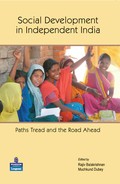Preface
The social and economic aspects of development were emphasized by leaders such as Mahatma Gandhi and Pandit Jawaharlal Nehru, as is reflected in their copious writings and speeches. A notable case in point was Nehru's celebrated ‘Tryst with Destiny’ address on the eve of India's emergence as a sovereign democratic entity. Subsequently, when India embarked on the path of planned development, the five-year plans were envisaged as an agency for both economic and social development. As the planning process unfolded, the social aspects of development became explicit, and there was a specific articulation of objectives and allotment of resources.
It was against this backdrop that the Planning Commission agreed to sponsor a study of social development concerns, which was to be carried out by the Council for Social Development. The Council took this opportunity to draw an overview of the social development in India since Independence and identify the emerging issues for the new millennium. This project culminated in a report titled ‘Social Development in India: An Overview of the Past Fifty Years and Emerging Issues for the Twenty-first Century’. Subsequently, with the endorsement of the Planning Commission, the Council decided to augment and update the report, and publish it in the form of this book.
The report is based on secondary sources including documents pertaining to the five-year plans, policy statements, data from published sources, books and articles. Thematically organized into three parts, namely, ‘The Theory and Concept of Social Development’, ‘Challenges of Social Development’ and ‘Social Pathologies’, the material has been arranged in ten separate chapters covering topics like the position of social development in development policy, population and family planning, the health scenario, literacy and education, poverty in India, and bringing gender into the mainstream of development. One chapter is devoted to conflict and violence, and one to institutions in crisis.
The initial draft was extensively edited, substantially rewritten and restructured, and new material inserted, to provide a more integrated picture. This painstaking and difficult task was carried out by one of the editors of this volume, Dr Rajiv Balakrishnan, Fellow at the Council, under the supervision of Professor Muchkund Dubey, President, Council for Social Development, who, as the director of the project, played a pivotal role in developing its concept, apart from coordinating and supervising the work relating to it. Professor Dubey also went over the entire text in its various versions and gave extensive suggestions for the editing, redrafting, updating and restructuring of the text.
The topics covered in this volume have been discussed with the backdrop of the deliberations and development of principles, norms and policies at the international level. The book provides a comprehensive and holistic treatment of social development issues from a historical perspective, and will be useful as a textbook and as a handbook for practitioners in the field of social development. It will also be valuable for students appearing in competitive examinations.
The Council is grateful to Professor S. N. Jha of the Jawaharlal Nehru University, Senior Consultant in the Project, for his contributions. He has presented an analysis of the social development programmes and policies in India, as outlined in the successive five-year plans, in selected sectors and problem areas. He was assisted by Anuradha Sen Mookherjee, a research scholar.
The Council owes a debt of gratitude to Harpal Singh who worked very hard on typing the manuscript of the parts of the report contributed by Professor Muchkund Dubey.
After a colossal amount of painstaking, meticulous work, we are now happy to place the book at the disposal of the reading public.
